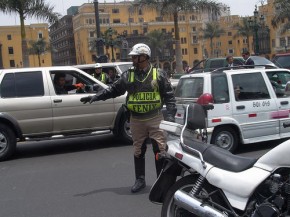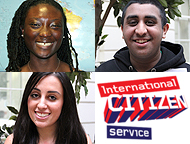We arrived in Peru after a 3am start and over 16 hours of travelling; tired, but ready to begin our ICS journey. We have now just finished ten days of orientation where we have been staying at a retreat for priests and volunteers in the capital, Lima, before moving to start our placements in Villa El Salvador.
I can't believe how much we have learnt in such a short space of time. We have had Spanish lessons every day - and for some, who have had no experience of the language before, it has been a bit of a challenge! On top of improving our ability to communicate with the people that we will be working with, we have also had a series of talks from development workers, environmental and human rights specialists, and the Peruvian correspondent for The Economist and Time magazine, Lucien Chauvin.
In these discussions, we have tackled issues ranging from water scarcity and environmental change to indigenous isolation and health problems. Something I found particularly interesting was learning about Peru's turbulent recent history of internal conflict and how this still affects these topics. Despite its classification by the World Bank as a middle income country, Peru's conflict has left a lot of areas still in need of development, including the public education system. I am really looking forward to playing a role in improving the situation through our placements teaching English.

Another key issue we have dealt with has been intercultural communication. After tours of Lima and some of its districts such as Miraflores and Barranco, our first impressions of the country and its people have been really positive and welcoming. However, there are definitely a few noticeable differences between Peruvian and English culture, the biggest of which, after the obvious language barrier, is the driving. Traffic here is far less orderly than in England and even crossing the road was a little bit daunting to start with! Despite this, we have benefited from another aspect of Peruvian culture: that of being very open and friendly - for example, greeting everyone in the room with a kiss on the cheek - which has made us feel very welcomed into the community.
Orientation has been a really great experience, and now that we know more about the placements we will be working on, we can't wait to move to Villa El Salvador and get started.

Ceri, Esi and Mohammed volunteered for ICS last year. Hear them talk about their experiences in Ethiopia, Uganda and Kenya in the latest DFID podcast.

4 comments
Comment by Angelica posted on
Hi. Stephanie.. I like your post its nice travelling in Peru a wonderful place and Im glad that you learned a lot in spanish language in short period of time there that was nice. I want to travel also in Peru if I have an opportunity I will.. Thanks to your inspiring blog
Comment by Pauleen posted on
This post was great.. After I read this post it really inspires me travelling in beautiful place in PERU.. Thanks to your blog Ms. Stephanie I am glad you learned more spanish language in short time that's great hope I do.
Comment by Removals Hounslow posted on
I would really love to visit Peru.
Comment by Joe Mitchell posted on
A very nice account of your experience in Peru. It seems that being fully immersed in the culture and country of a language that you are trying to learn is one of the best ways to learn that language quickly. I've had a similar experience with regard to the disorganised traffic in other countries when on a month long tour around Thailand a number of years ago. Like you say just getting used to crossing the streets alone can take some time!
Joe.